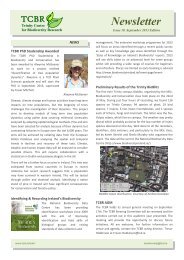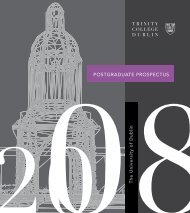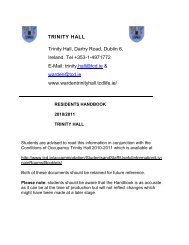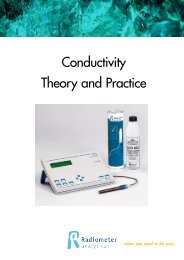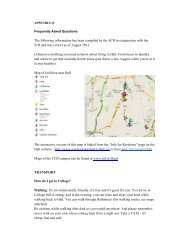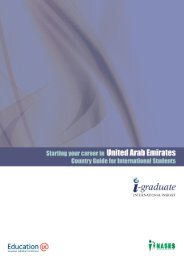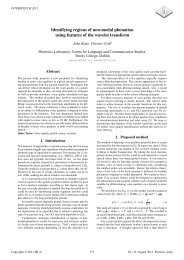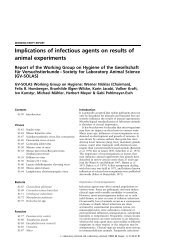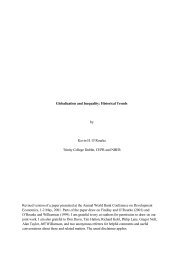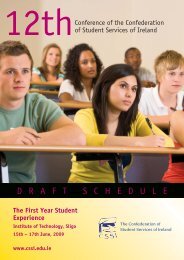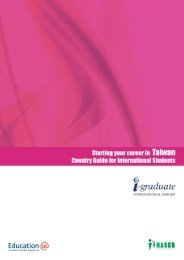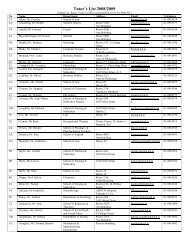Conference Programme (PDF, 1019KB) - Trinity College Dublin
Conference Programme (PDF, 1019KB) - Trinity College Dublin
Conference Programme (PDF, 1019KB) - Trinity College Dublin
You also want an ePaper? Increase the reach of your titles
YUMPU automatically turns print PDFs into web optimized ePapers that Google loves.
abstracts by stream and session<br />
Academic sphere and immigrant children in Ireland<br />
Merike Darmody, ESRI Economic and Social Research Institute, Ireland<br />
In Ireland, recent years have seen some movement from a culturally homogenous society to a more diverse one, with increasing<br />
numbers of immigrant children and youth living in Ireland. However, little is known about how immigrant students cope academically<br />
in Irish schools and what issues emerge for teachers. Based on a large-scale mixed methods study on immigrant children in primary<br />
and secondary schools – the first of its kind carried out in the Republic of Ireland – this paper focuses on the academic orientation,<br />
curriculum and teaching of immigrant students.<br />
Integration and Identity: Evidence from Governments, Schools and Youth in Europe<br />
Daniel Faas, <strong>Trinity</strong> <strong>College</strong> <strong>Dublin</strong>, Ireland<br />
Globalization, European integration, and migration are challenging national identities and changing education across Europe. The<br />
nation-state no longer serves as the sole locus of civic participation and identity formation, and no longer has the influence it once had<br />
over the implementation of policies. Drawing on documentary sources, semi-structured interviews with students and teachers as well<br />
as focus group interviews across four schools in Germany and Britain, this paper examines how schools mediate government policies,<br />
creating distinct educational contexts that shape youth identity negotiation and integration processes. The study is the first of its kind to<br />
bring together between-country and within-country differences in identity formation among young people. By delving into the discourses<br />
of ethnic majority and Turkish minority youth, the talk unravels a wide range of factors shaping contemporary identities and offers new<br />
insights into the particular role school policy approaches play in this process. The paper situates these discussions within broader<br />
European and transatlantic theoretical and empirical debates on immigrant incorporation.<br />
SESSION 3e Second Generation Immigrant Youth / Masculinities and Migrant Boys<br />
Generating intercultural integration or reproducing the Others? An anthropological study of Ecuadorian and Moroccan immigrants’<br />
children in the secondary schools in a district of Seville.<br />
Simone Castellani, University of Seville, Spain<br />
The so-called “second generation” of migrants is a new phenomenon within southern European countries such as Spain, Italy, Portugal<br />
and Greece, which recently became destinations of intensive international migratory flows. The international migration towards these<br />
countries, which several authors named ‘New Migration’ (King, 2001; Pugliese, 1992), is understandable within a framework of macro<br />
social transformations, beginning in the middle of the 1970s. It developed in a context of increased inequality between world regions<br />
caused by the global expansion of capitalism (Wallerstein, 1974). The progressive transformation from a Fordist to a post-Fordist model<br />
of production generated a precarious and unprotected labour market in developed countries. Most of the migrants who come from third<br />
countries can enter this kind of labour market only in the job sectors, which require lower qualifications. This situation is supported by<br />
a set of laws to contain the migration fluxes, which make the regularization of non-EU citizens difficult, and are promoted by different<br />
States and by the EU. This is the reason why many migrants who reside in southern European countries have often an irregular status;<br />
this contributes to the invisibility of these subjects and the negation of their human rights.<br />
Taking into considerations these transformations, it is highly interesting to investigate the “second generation” in the EU new migration<br />
destination countries, underlining the differences existing with studies made about migrants’ children in the context of Fordist migration<br />
to Northern European countries. It is plausible to hypothesize that the situation of job insecurity and the restriction of citizenship, which<br />
the parents suffered, influence the pattern of inclusion and development of these children.<br />
The School is a privileged unit of observation to study the influences of the national policies on migrants’ children. As highlighted by<br />
Bourdieu y Passeron (1972), the educational institution is one of the main socialization spaces where the structure of society and the<br />
ideology of the Nation-State are reproduced. The school is, also, one of the main contexts of socialization for a minor, along with the<br />
family and the peer group.<br />
The research presented in this paper is part of a thesis project, which aims to investigate the processes of identity construction among<br />
underage ’second generation’ Moroccans and Ecuadorians in the city of Seville (Spain). The project is based on an ethnographic fieldwork,<br />
consisting of participant observation and qualitative in-depth interviews, which intends to analyze the three main contexts of socialization<br />
of these teenagers: school, family and peer group.<br />
This paper presents the preliminary results of the fieldwork carried out in secondary schools in Seville. At first, it focuses on the analysis<br />
of the representations of migrants’ children generated by the school staff. In particular, it aims to examine the educational activities and<br />
the new job positions promoted within the framework of interculturality by some Andalusian educational policies, such as the classes<br />
for no Spanish speakers (ATAL), the mother culture workshops or the intercultural mediators. Finally, the paper explores how the<br />
representations, generated by institution and its members, influence the processes of identification of these young people in their peer<br />
groups within the school context.<br />
From the analysis of the data, it is possible to disclose some preliminary conclusions. Firstly, there is some evidence that the<br />
intercultural programmes, instead of encouraging the valorisation of the cultural differences, tend to construct these children as ‘Others’.<br />
Paradoxically, it seems that the diffusion of the “intercultural wave”, which introduced new activities in the school curriculum, contributes<br />
to confirm some culturalist representations and increase the stigmatization of these teenagers. In other words, these children are<br />
considered as natural carriers of parents’ culture, within a scale of distinctions on the basis of the arrival age in Spain, as well as their<br />
parents’ previous “cultural area”, and the ethnic composition of the peer group in which these minors take part.<br />
69



